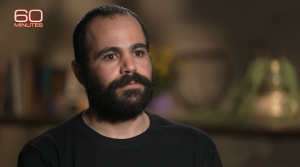After seven long years in Los Angeles, Aaron Miller was about to give up. The Canadian-born actor was growing tired of being passed over, season after season, for leading roles.
Miller, 32, is a rising star whose talent and charisma have shone since he first caught the acting bug at age 12. His acclaimed performances on stage and screen led to his decision to move south, where he was included on countless lists of the “next big things” to expect from Hollywood.
But the roles never came.
“It would always go the same way,” remembers Miller. “Casting directors love me, they want to work with me, and I’d never hear from them again. I could never understand it.”
As the rejections – and the bills – started mounting, Miller decided to find out, once and for all, what was going on. Was this just bad luck? Had he said the wrong thing to the wrong person? Had someone started a troublesome rumour about him?
“I started asking anyone I met, ‘What’s going on? What have you heard?’ And I started to hear this one answer again and again.”
The answer is an old, dirty Hollywood secret: Aaron Miller didn’t look Jewish enough.
“That really came as a surprise to me,” says Miller. “Back in Montreal, everyone could tell I was a Jew. They’d shout it at me from across the street! But this is Hollywood, and things can be a little superficial when you’re up for an SSP.”
An SSP, or “supportive semitic partner,” role (also known as Rudd Roles), is the holy grail of parts for young Jewish actors like Miller, allowing them to flex their self-deprecating comic chops in leading romantic comedy roles.
“An SSP may not always get the girl, but he’ll always get a punchline,” says Miller, calling it “the role I was born to play.”
But the SSP needs to strike a delicate balance – the popular adage demands that the SSP be “likeable, but not cool; attractive, but not threatening and clever, but not smooth,” he says. And even though he has the phrase tattooed on his forearm, Miller’s perfectly proportioned facial features were holding him back.
The last straw for Miller came in 2012, when he lined up auditions for eight SSP roles, but was ultimately passed over for all of them in favour of Jason Segel, Paul Rudd, Seth Rogen, Andy Samberg, Adam Scott, Zach Braff, Josh Radnor and Bill Hader, respectively.
That’s when Miller made the decision that would forever alter the trajectory of his career – he opted to undergo a surgical procedure designed to optimize his facial features for “ethnic-cinematic equilibrium” in screen tests.
The surgery is not without controversy – critics in the press and social media have attacked Miller’s decision to “go native” – but he defends his decision.
“I had a lot to offer,” he explains, “but I can’t offer anything if no one’s looking at me.”
Miller doesn’t regret his decision, but he advises caution to aspiring actors who might choose to follow in his footsteps:
“Looking a certain way is only the beginning. I see a lot of guys in auditions – they saved up to get their noses enlarged, and then they head straight for Hollywood. But no one’s buying it.”
For Miller, the surgery meant increasing the visibility of his semitic features by approximately 32 per cent.
“Do I wish it hadn’t been necessary? Of course. But it’s a demanding industry. I’ve got nothing to hide.”
And the industry is certainly looking now, with Miller’s star on the rise since his return to the scene. Significant Oscar buzz swirls about his post-surgical portrayals of Dan Green, the insecure watchmaker looking for love in a digital age in Time and Again, and Ben Stone, a widower and single dad who accidentally starts dating both of his daughters’ teachers at once in Two Apples.
Through it all, Miller remains humbly dedicated to honing his craft. “There are no shortcuts to success,” he maintains. “Only surgical ones.”
Follow David Levine on Twitter






